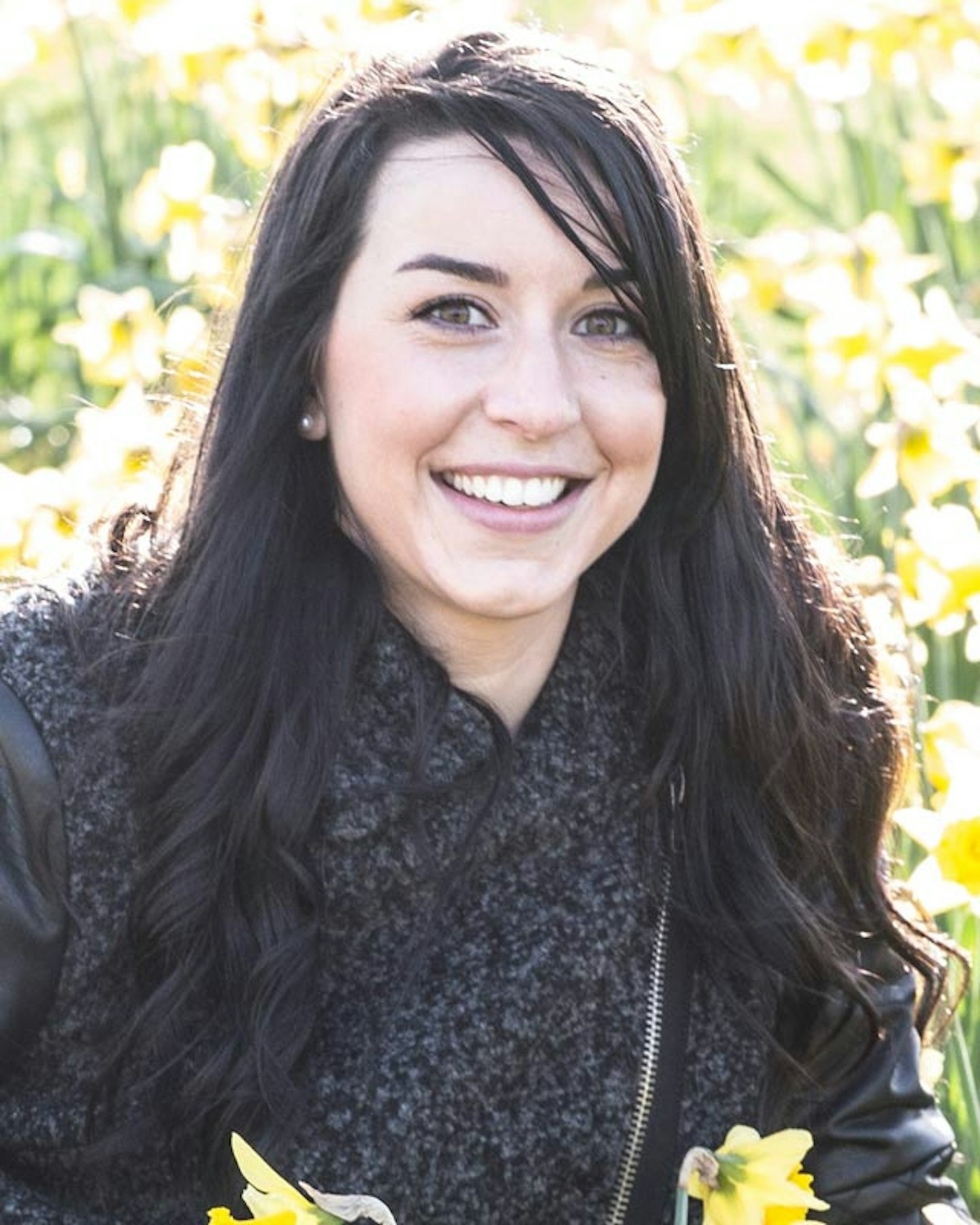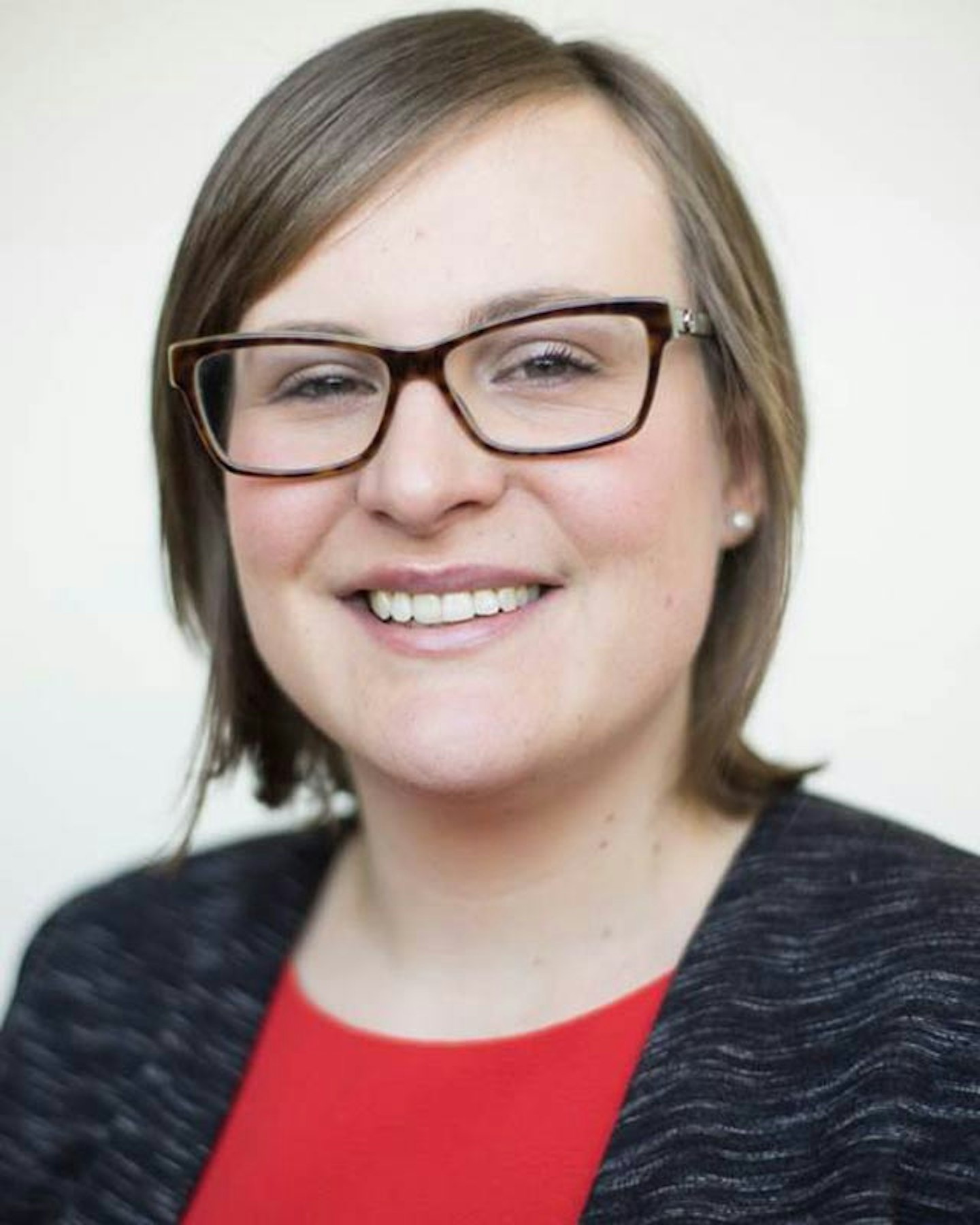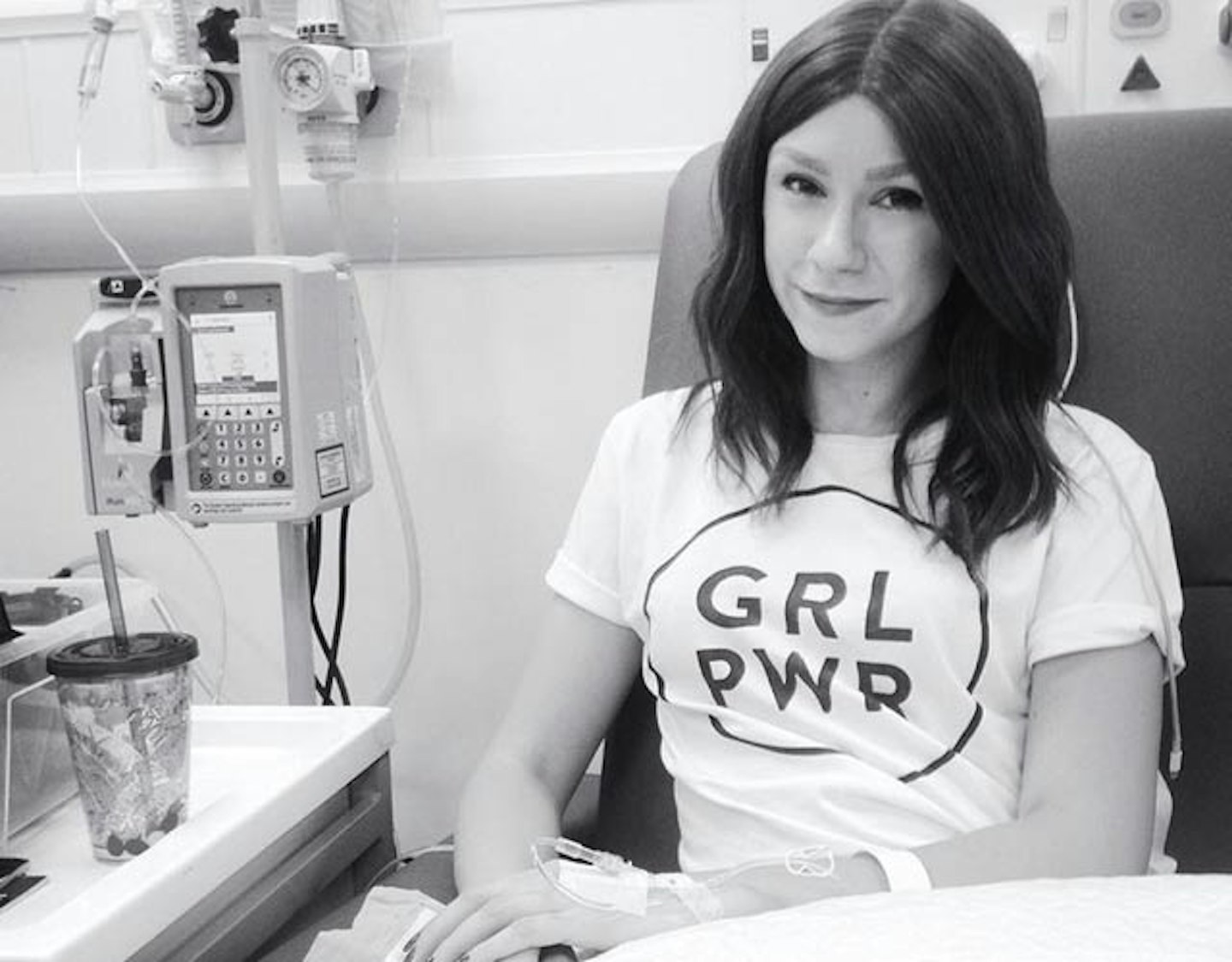This month is Ovarian Cancer Awareness month. Over 7,000 women are diagnosed with ovarian cancer each year and over 4,100 women die from the disease during that time. This makes ovarian cancer the biggest killer of all gynaecological cancers.
However…
Very few women even know of its symptoms – one in five it has been estimated. Whilst it mainly affects women who are over 50 (or who have been through the menopause), women in their twenties and thirties can be at risk. Furthermore, it cannot be detected by smear tests.
Here, three young women, who have survived ovarian cancer, share their harrowing experiences of the illness…
Lisa, 26

Lisa was 21 and in the final semester of her Kinesiology & Rehabilitation Science degree, studying on her term abroad in Hawaii. She had always been active, and was training for a marathon and surfing every day.
‘I was having sex with my boyfriend and had really severe abdominal pains that were really uncharacteristic,’ she remembers. ‘It lasted several days.’
She went to the doctor who told her she had a cyst and sent her for an emergency ultrasound. The scan confirmed there was ‘a mass’, the size of a grapefruit, and she was scheduled for an emergency appointment with the only gynecology oncologist on the island.
At that time, however, she wasn’t unduly worried. She had been born with polycystic ovaries and thought it was probably a cyst that had burst. She carried on as normal, surfing and seeing friends, and put her symptoms – weight loss, decreased appetite and an increased need to urinate – down to her marathon training.
However, she remembers going for a run one day and suddenly feeling something moving inside her. ‘I put my hand on my stomach whilst I was running, and I was like “What is that?” I also remember lying on a surfboard and feeling like [I was] rolling on a water balloon.’
Her mother flew over from Canada – Lisa is Canadian – for her surgery to remove the mass, which, by that point, was the size of a basketball. ‘My mum came with me to the doctors office. He [had] the pathology report… and when he told us what the diagnosis was, I just blanked… I don’t remember anything else of the conversation. Luckily, my mum was there to ask a whole bunch of questions.’
Lisa was diagnosed as having a borderline ovarian tumour. ‘It’s the one that doesn’t respond to chemo or radiation,’ she explains. ‘The way the cells are, it’s contained within the cyst. So, as long as it stays within the cyst, it doesn’t spread.’
Owing to her age and fitness, Lisa managed to recover from surgery fairly quickly. ‘I was surfing within three weeks and running within a month. I was adamant that because I was living in Hawaii, I had to get back on my surfboard.’
What the doctors hadn’t told her, however, was that her surgery had not gone entirely to plan. Her tumour was so large, it had burst during her operation. A one-hour procedure had turned into four hours of surgery. And although an emergency clean-out was performed, not all of the tumour had been removed.
Three months later, Lisa was back in Canada and she started to feel her symptoms return. ‘I instantly knew it was back,’ she says.
‘Because the tumour burst during the first operation and my consultant hadn’t told me – or anyone – it then regrew. We were worried about regrowth on other organs, because if it spread, chemo and radiation wouldn’t [help]. That’s all they knew about it. There wasn’t very much research.’
Thankfully, her second surgery was successful. Her physical health returned to normal soon after, but it was then that she started to experience psychological difficulties. ‘I went into an emotional psychological turmoil for a while,’ she explains. ‘And I didn’t attribute it to what I went through. I had never been through anything psychologically and emotionally challenging before in my life. Everyone I met was like, “You’re so young, you’ll rebound, you’ll be absolutely fine”.
‘Physically I was fine. My second surgery took a little bit longer to recover from, but I was fine. However, I felt really trapped in my diagnosis. I was being defined by being a cancer survivor. And I didn’t want to be ‘a cancer survivor’, I wanted to be myself. I was 21 and I didn’t know how to deal with those kind of things. No one knew how to help me or where I could seek counselling services. The only thing I could think of was to pack my bags and starting somewhere new.’
Lisa flew to the UK to continue her studies at Northumbria University in Newcastle. But she had to wait five years before getting the all clear. That was the time she found particularly challenging. ‘After the five year window, you should be OK. The chances [of it returning] should be a little bit lower.
‘In the mean time, because my first surgery was so horrific – and I had to go through everything twice in a matter of months – I decided that if it ever came back, I was getting rid of both my ovaries. I was not dealing with this shit again. It was just too much. At a really young age I just decided that I would never have children – which is a really messed up thing when I think about it now.’
Lisa graduated in 2014 and now, five years on from her diagnosis, lives and works in London as a physiotherapist – her dream profession.
‘It’s only in the last three years, I’ve really come to terms with not self-identifying myself as a cancer survivor,’ she says. ‘That’s part of me, but that’s not all of me.
‘I’ve designed my life to fulfill myself. My family hate [that I’m in London] cos I’m really close to [them and they’re] in Canada, but for me it was about doing the things that I get pleasure from doing – travelling, meeting people and [experiencing] cultures.
‘I really love living in London,’ she says. ‘For my career, I couldn’t live anywhere else and do the things that I do with my physio, it’s just so prosperous. I am really happy. ’
Emily, 30

Emily started experiencing symptoms of ovarian cancer a few days after her 27th birthday. She was living with her boyfriend in West Hampstead at the time, working as a marketing manager for engineering company, AECOM.
‘I had severe tummy pains like nothing I’ve ever experienced before. Not like period pains or an upset tummy, I was really bloated. So I went to my GP straight away.’
Her doctor thought she had appendicitis and she was rushed to A&E. She had scans and blood tests, and her initial diagnosis was that one of her ovaries had twisted. She was given an emergency operation and it was only then that her tumour was discovered. However, because the doctors didn’t know if it was cancerous or not, Emily was not operated on. She was stitched back up to await the results of further tests.
Two weeks later, the results confirmed she had the early stages of ovarian cancer. She was referred to a specialist cancer hospital at University College London.
‘I guess it hadn’t even crossed my mind that it could be cancer,’ she says. ‘I know it sounds really stupid, but it came as quite a shock – because I was so young. At that point, you’re like, “Ok, well, what’s the next step – and what are we going to do about this?”
‘The wait in-between was the worst,’ she continues. ‘They told me I had a tumour and I had to wait for the results – the uncertainty was horrible. You’re waiting thinking: “Oh God, I’ve got this absolutely massive tumour inside me”. It felt very surreal.’
Emily had a second operation to remove the tumour, but because it was attached to her left ovary, they had to remove her ovary as well.
‘My first response was, “What happens now?” But the other ovary just takes over. You have your period every month and you’re still fully capable of having children. Because I was on the contraceptive pill – not having actual periods – I did wonder, “Is the other ovary actually alright. Is it working?”
Emily’s second surgery went well, and because her surgeons were confident they managed to remove all of the tumour, she didn’t have to have chemotherapy. Instead, she underwent blood tests and scans every week. After time, it was reduced to once every two weeks, then every month. But the check-ups continue for five years, and Emily is three years into the process.
‘I have only blood tests every six months now, which is really good. But you get a good result, and that’s great, and then you think: “The next one won’t be…” It’s really hard to live with that kind of uncertainty, constantly have something tested all the time… but you wouldn’t want it not to be.’
‘It’s quite a horrible period,’ she continues, ‘and I’ve found it the hardest bit. There’s the potential for it to affect your fertility. For a younger woman who hasn’t started a family or even thought about it, it’s very tricky. My boyfriend and I had to have those conversations and that was quite hard as well.’
Following her treatment, Emily went to see a psychiatrist to discuss her fertility worries and fears her cancer might return. ‘They gave me some really good mindfulness techniques and CBT (Cognitive Behavioral Therapy),’ she says. ‘Just tools to cope and put everything into perspective.’
‘Mental health is not really talked about in terms of cancer patients because people are concentrating on getting rid of the disease,’ she continues. ‘They don’t think about how it’s actually impacting the person, and what’s going on in their mind to cope with it.’
After three months, Emily was back at work at AECOM, and moved to Enfield with her boyfriend. They got engaged whilst on holiday in Yosemitie National Park, USA and are now preparing for their wedding in just under a month.
‘Things are going well,’ she says. ‘I got an industry award at the end of last year, Young Marketer of the Year. What I say about [cancer] is it gives you more strength and confidence and the positivity to go and do stuff. I really do feel you’re less hung up on the detail. You think, “Well, I’m going to go and do everything that I want to do.”’
Charlotte, 26

Charlotte was 25 and working as a graphic designer in Nottingham, designing food packaging, when she experienced her first symptoms. ‘It all happened really suddenly,’ she says. ‘One night just had severe stomach pains and I was rushed to A&E with suspected appendicitis. I had an ultrasound scan that revealed a 14cm mass on my ovary.’
However, in spite of what was found, the mass was misdiagnosed. Charlotte was told she had a pelvic infection and was sent home with antibiotics. ‘It took almost 6 months until I was [correctly] diagnosed,’ she says. ‘Because of my age, they didn’t expect it was cancer at all. So it wasn’t until I had abdominal surgery, in November 2015, that they found out [what I had].’
In the interim, Charlotte experienced the ‘typical’ symptoms of ovarian cancer. ‘I became really bloated, which I then found out was fluid in my abdomen. So I had to have 3litres of fluid drained out. It was really uncomfortable. I was still working at the time and I was so tired, and in a lot of pain. They were running tests to find out what was causing all of this, but it just took a long time.’
They didn’t mention cancer was even a possibility until the week before Charlotte’s initial surgery, in October 2015. ‘They said it was really unlikely due to my age, and that it’s really not common in like women under 60. So at the time I was thinking, “Well, they’ve mentioned this, but it probably won’t be that.”’
When she finally had surgery, keyhole surgery, the mass was diagnosed as ‘a cyst’. The following month, she had abdominal surgery to remove it, and it was only when the results came back from that, that Charlotte was told she had Stage 2c cancer.
‘The day I found out it was like my world completely stopped,’ she explains. ‘I was kind of thrown into all these things I’ve not had to consider before – things like my fertility and chemotherapy.
‘They had to remove my ovary that was attached to the tumour as well, because the tumour was so large. But after my diagnosis they said they’d have to come back and do more surgery.’
Charlotte underwent chemotherapy once every three weeks for the next six weeks, but in the middle of it, she had to have a third operation, a hysterectomy – which, together with the chemo, was the ‘line of treatment’ for cancer at Stage 2 (not ‘advanced’ but not considered ‘early’ either). The hysterectomy removed Charlotte’s uterus, preventing her from ever becoming pregnant.
‘It was hard because at the time I was so focused on my career and seeing friends, I hadn’t really thought about where my future would go in terms of having a family. I always presumed it was something I would do in the future. So it was hard having that choice taken away from me. It’s really difficult to get your head around that stage of life, when you’re not even considering it in that moment.’
Charlotte was home for her treatment and cared for by her mother who was in remission herself, having had breast cancer four years previously. ‘Having her there, having been through the same thing, was a really good support. And all my friends were fantastic as well.’
‘I remember feeling quite sick a lot of the time,’ she says of chemotherapy. ‘It was tough. I couldn’t work and it was quite difficult seeing friends and family’s lives carrying on around me.’
It was during that time, however, that two of Charlotte’s friends approached her with an idea – a project, they named GRL PWR, to raise awareness for ovarian cancer in young people. They started fundraising, making and selling t-shirts, and even recruited the help of British actress Vicky McClure to share the message.
‘I guess my attitude was if there’s ever a time I can make a difference in the world, it was using this to do that,’ says Charlotte. ‘So I focused all my energy on doing something positive by fundraising.’
When her chemotherapy ended, Charlotte had follow-up appointments every three months, including blood tests to detect whether the cancer had returned. She sought counselling to help manage her anxiety around those appointments, helping her come to terms with the trauma of what she had experienced. ‘I also did a mindfulness course, which is about focusing on the moment and not worrying too much about the future – things that you cant control. I try to take each day as it comes.’
She’s now back at work full time and working on GRL PWR. ‘We just want to take it as far as possible. If we can make a difference to one person’s life, I consider that an achievement.’
grlpwr.bigcartel.com
Be in the know
Symptoms of ovarian cancer include:
1.) Persistent pelvic or abdominal pain (your tummy and below)
2.) Increased abdominal size/persistent bloating – not bloating that comes and goes
3.) Difficulty eating or feeling full quickly
4.) Needing to wee more urgently or more often than usual
5.) Occasionally there can be other symptoms such as changes in bowel habits, extreme fatigue, unexplained weight loss or loss of appetite.
Any post-menopausal bleeding should always be investigated by a GP.
If you regularly experience any of these symptoms – which are not normal for you – it is important that you see your GP. It is unlikely that your symptoms are caused by a serious problem, but it is important to get checked out.
Join Target Ovarian Cancer and #StartMakingNoise to spread the word about the symptoms of ovarian cancer this Ovarian Cancer Awareness Month.
Find out more at targetovariancancer.org.uk/March
